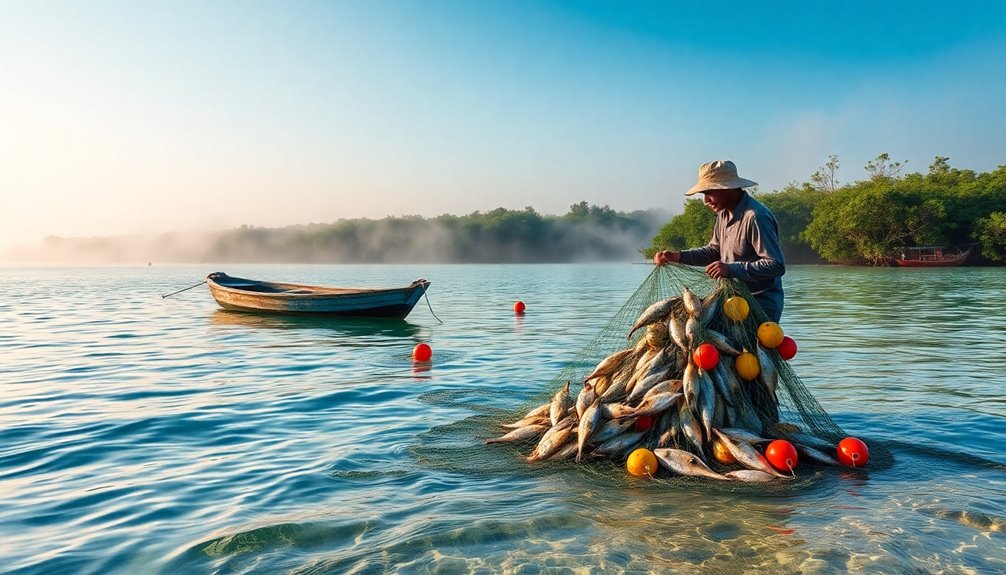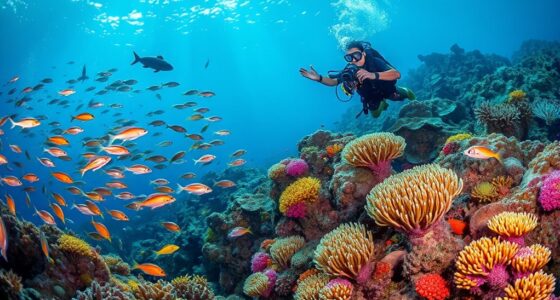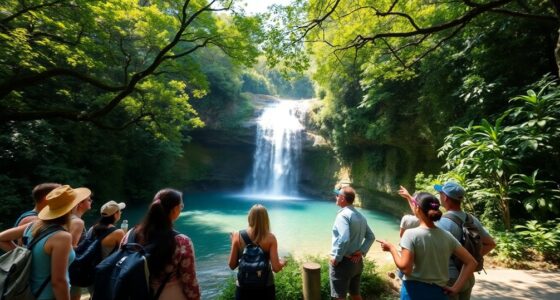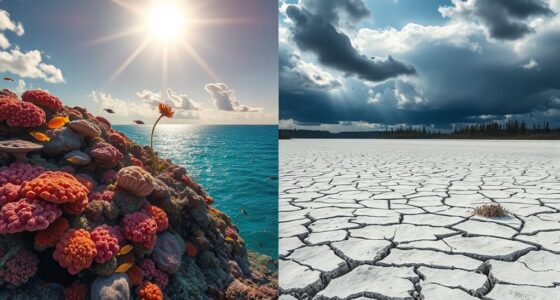Sustainable fishing practices are essential for protecting our oceans and ensuring healthy fish populations. By using selective fishing methods, adhering to catch limits, and supporting local fisheries, you can minimize bycatch and habitat damage. Participating in community initiatives and choosing seafood with certification labels, like MSC or ASC, helps promote eco-friendly techniques. These practices not only support local economies but also safeguard marine ecosystems for future generations. There's a lot more to uncover about sustainable fishing and its benefits!
Key Takeaways
- Use selective fishing methods to significantly reduce bycatch and protect marine life.
- Follow seasonal catch limits to ensure fish populations remain healthy and sustainable.
- Support local fisheries that employ eco-friendly practices and contribute to their economies.
- Participate in community initiatives, such as beach clean-ups, to promote marine conservation.
- Choose seafood with certification labels like MSC or ASC to ensure responsible fishing practices.
The Importance of Sustainable Fishing
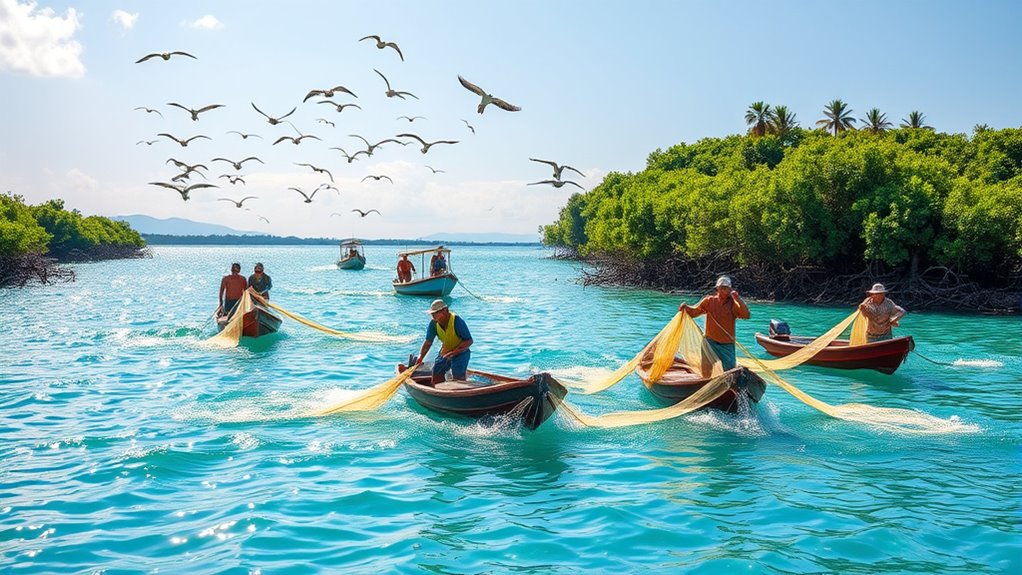
Sustainable fishing is crucial for preserving our oceans and ensuring future generations can enjoy their bounty. When you practice sustainable fishing, you help maintain healthy fish populations and protect marine ecosystems.
By choosing methods that minimize bycatch and habitat damage, you contribute to the balance of ocean life. Supporting local fisheries that prioritize sustainability strengthens communities and promotes responsible consumption.
You also play a role in advocating for policies that protect marine environments, ensuring that our waters remain vibrant and productive.
Overfishing: A Global Crisis
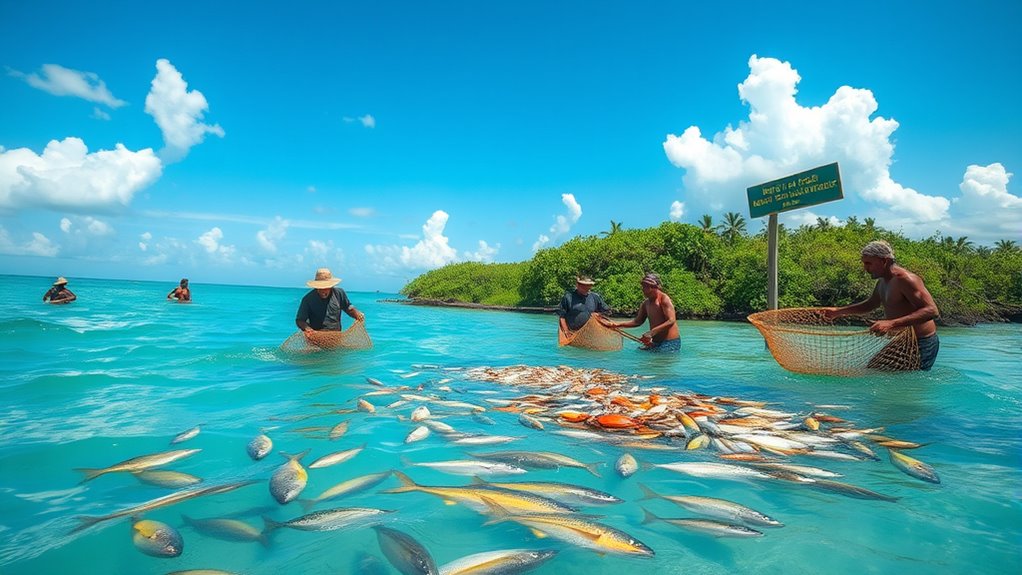
While many fish populations are dwindling, overfishing remains a pressing global crisis that threatens marine biodiversity and the livelihoods of millions.
You mightn't realize it, but your dining choices can contribute to this issue. Unsustainable fishing practices strip oceans of vital species, disrupting ecosystems and leading to imbalances.
As fish stocks decline, fishermen are forced to venture further and fish more aggressively, creating a vicious cycle. This doesn't just impact fish; it affects entire communities that rely on healthy oceans for their income and food security.
Key Sustainable Fishing Practices
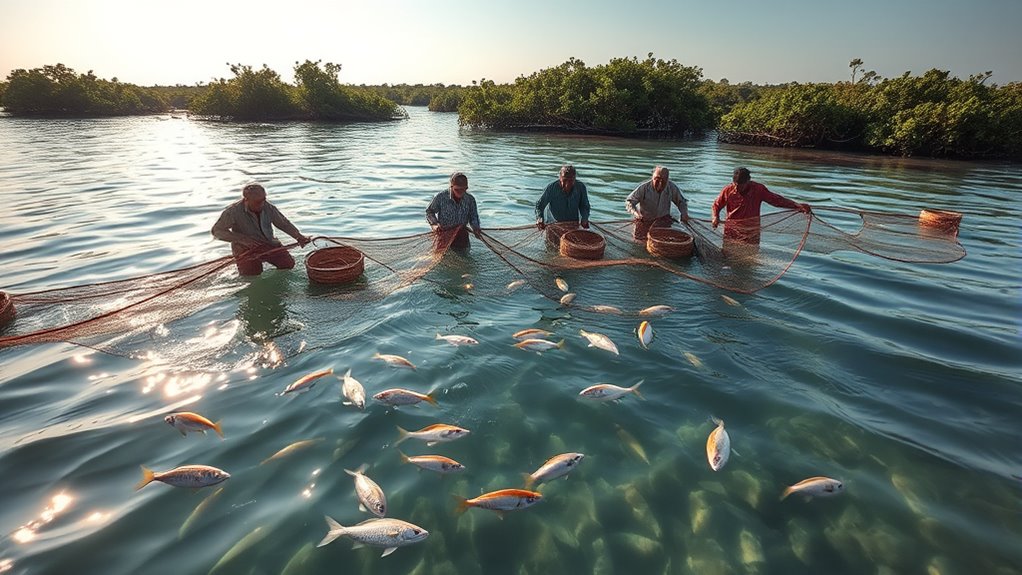
To ensure the health of our oceans and the future of fishing, adopting key sustainable fishing practices is essential.
Start by choosing the right gear; using selective fishing methods helps reduce bycatch and protects marine ecosystems.
Next, pay attention to seasonal fish populations and avoid overfishing by adhering to catch limits.
You should also support local fisheries that prioritize sustainability, as they often employ eco-friendly techniques.
Participating in community initiatives, like beach clean-ups, reinforces your commitment to ocean health.
Lastly, educate yourself and others about sustainable seafood choices from certified sources.
The Role of Aquaculture in Sustainability
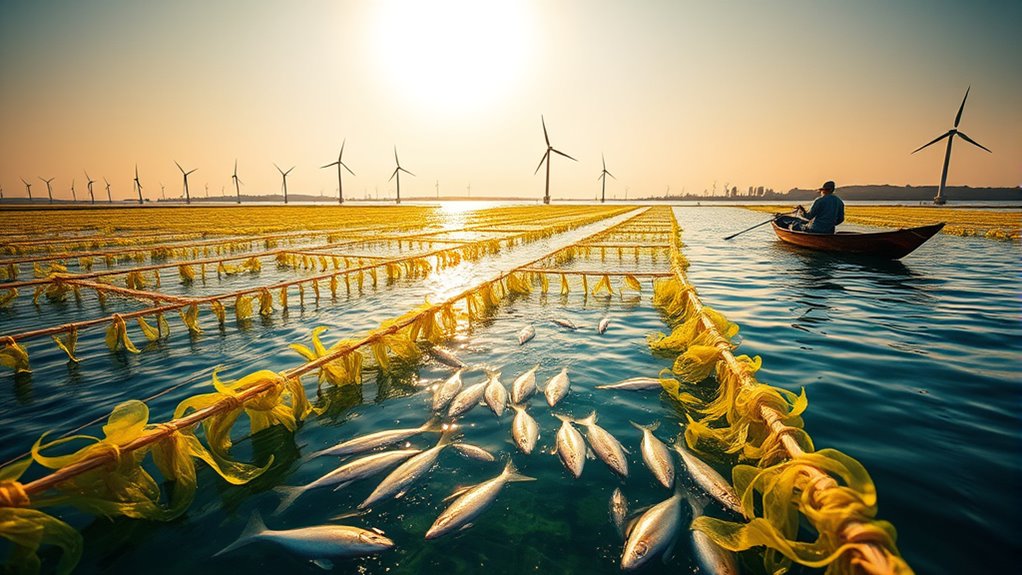
Aquaculture plays a crucial role in promoting sustainability within the fishing industry. By cultivating fish and seafood in controlled environments, you help reduce pressure on wild fish populations. This method allows for the production of high-quality protein while minimizing overfishing.
As you engage in aquaculture, you can choose practices that prioritize environmental health, such as using sustainable feed sources and maintaining water quality. Furthermore, responsible aquaculture can enhance local economies by providing jobs and supporting small-scale operations.
Community-Based Fishing Initiatives
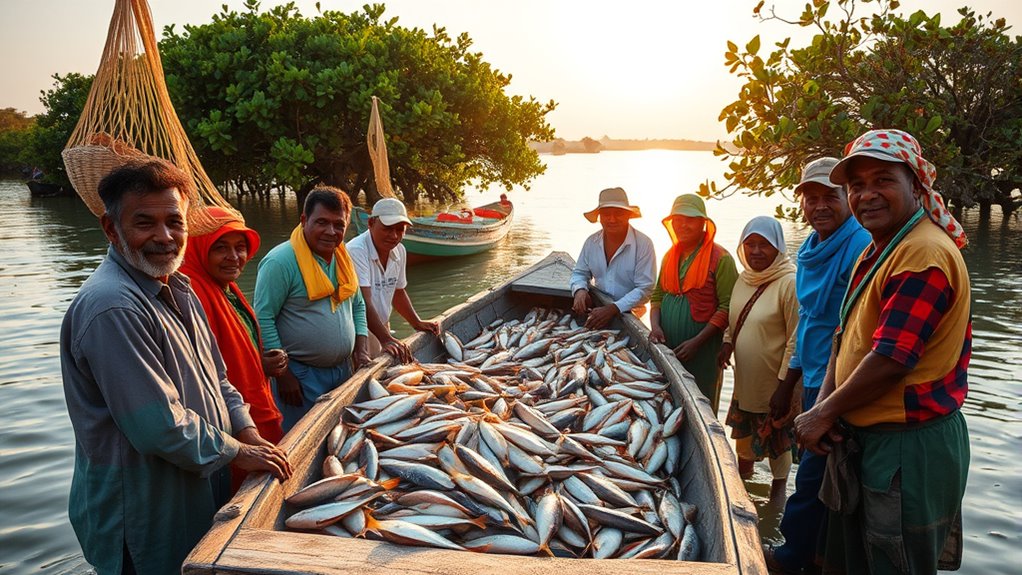
Community-based fishing initiatives empower local fishermen to manage resources sustainably, ensuring that both the environment and their livelihoods thrive.
By participating in these initiatives, you'll find that community members work together to establish rules that prioritize fish populations and habitat health. These efforts often include setting catch limits, implementing seasonal closures, and using selective fishing gear.
You'll notice that the focus on cooperation fosters a sense of responsibility and stewardship among fishermen, which leads to healthier ecosystems.
Additionally, engaging in community-based initiatives helps build local economies, as fishermen sell their catch directly to consumers or local markets. This approach not only supports your community but also promotes sustainable practices that can be passed down through generations.
The Impact of Consumer Choices
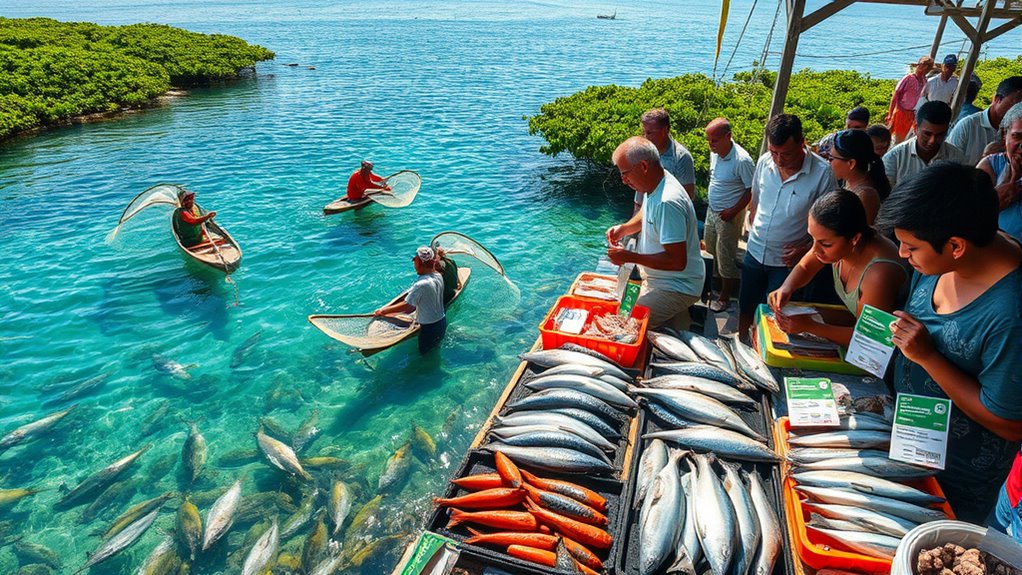
As consumers increasingly prioritize sustainability, your choices at the market can significantly influence fishing practices. When you opt for seafood from responsible sources, you send a clear message to suppliers about the demand for sustainable options.
By choosing fish that are caught using methods that minimize bycatch and habitat destruction, you contribute to healthier ocean ecosystems. Supporting local fisheries can also bolster community economies while ensuring that fishing practices align with sustainable standards.
Additionally, staying informed about overfished species lets you make smarter decisions, reducing pressure on vulnerable populations. Your voice matters; every purchase shapes the market.
Certification and Labeling Programs
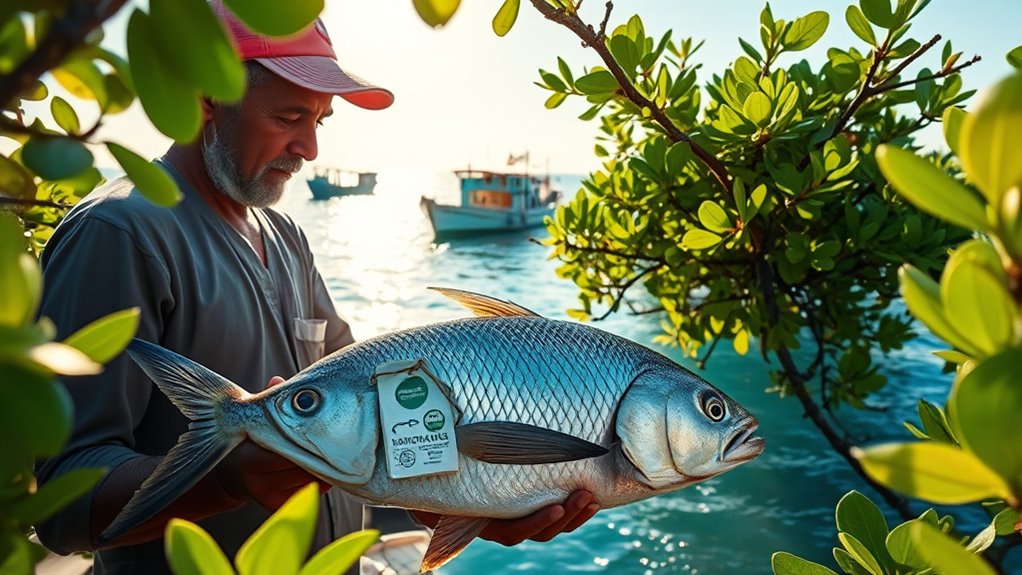
How can you tell if the seafood you're buying is sustainably sourced? Look for certification and labeling programs.
These programs, like the Marine Stewardship Council (MSC) and the Aquaculture Stewardship Council (ASC), ensure that seafood meets strict sustainability standards. When you see these labels, you can trust that the fish was caught or farmed responsibly, minimizing environmental impact.
Look for labels from the Marine Stewardship Council (MSC) and Aquaculture Stewardship Council (ASC) to ensure responsibly sourced seafood.
Familiarize yourself with these certifications, as they help you make informed choices. Remember, not all seafood is created equal; some labels indicate better practices than others.
By choosing certified products, you support sustainable fishing methods and contribute to the health of our oceans.
Next time you're at the store, check for these labels to make a positive impact with your purchase.
Future Trends in Sustainable Fishing Practices
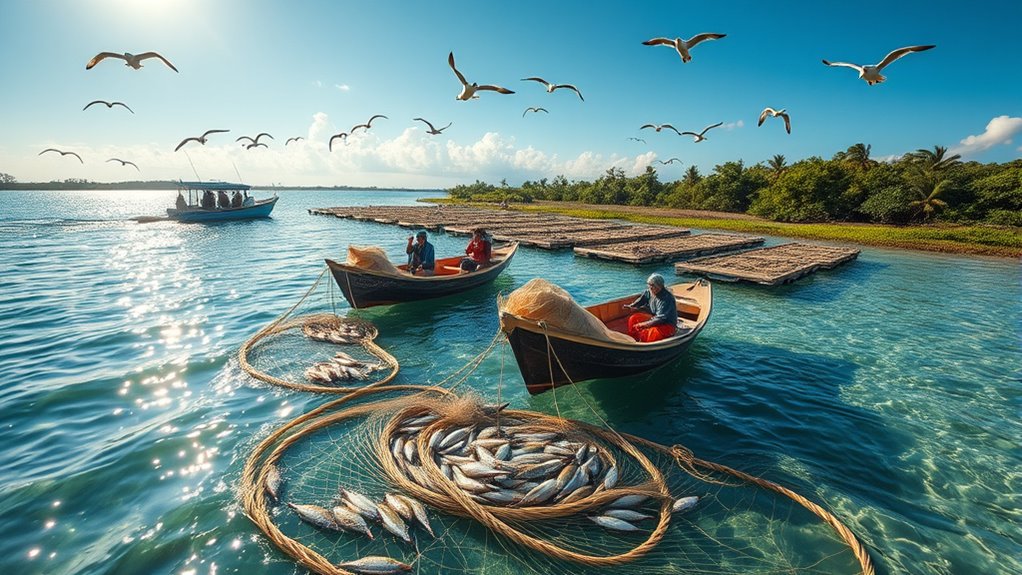
With growing awareness of overfishing and environmental degradation, the future of sustainable fishing practices is leaning towards innovative solutions.
You'll likely see the rise of technology-driven methods, like drone monitoring and AI analytics, which help track fish populations and minimize bycatch. Blockchain is set to enhance transparency in the supply chain, ensuring that your seafood comes from responsible sources.
Aquaculture will continue evolving, focusing on closed-loop systems that reduce waste and environmental impact. Additionally, community-driven fisheries management is gaining traction, empowering local stakeholders to make decisions that benefit both the ecosystem and their livelihoods.
As a consumer, you'll play a vital role by supporting brands that prioritize sustainable practices, steering the market towards more responsible fishing methods.
Frequently Asked Questions
How Can I Get Involved in Local Sustainable Fishing Initiatives?
You can get involved in local sustainable fishing initiatives by reaching out to community organizations or environmental groups.
Attend workshops or events focused on marine conservation to learn more about the issues.
Volunteer for clean-up projects at local waterways or join citizen science programs that monitor fish populations.
You might also consider supporting local fisheries that prioritize sustainability.
What Are the Economic Benefits of Sustainable Fishing for Communities?
You might think economic benefits are limited to immediate profits, but sustainable fishing can actually boost local economies in the long run.
By preserving fish populations, you ensure a consistent supply, which supports local jobs and businesses.
Plus, healthier marine ecosystems attract tourism, providing additional revenue streams.
Investing in sustainable practices means you're not just protecting the environment; you're also fueling your community's economy and creating a more resilient future for everyone involved.
How Does Climate Change Affect Sustainable Fishing Practices?
Climate change impacts fishing by altering ocean temperatures and currents, which affects fish populations and their habitats.
You might notice that shifting weather patterns can lead to unpredictable fish migrations, making it harder for you to catch certain species.
Additionally, increased ocean acidity can harm marine ecosystems.
As these changes occur, you'll need to adapt your fishing practices to keep up with the evolving environment and ensure a stable supply of fish.
What Are the Nutritional Benefits of Consuming Sustainably Caught Fish?
Consuming sustainably caught fish offers numerous nutritional benefits.
You'll get high-quality protein, essential omega-3 fatty acids, and vital vitamins and minerals like B12 and iodine. These nutrients support heart health, boost brain function, and promote overall well-being.
Plus, by choosing fish sourced responsibly, you're contributing to healthier oceans, which can lead to better fish populations and, ultimately, a more stable food supply.
How Can I Educate Others About Sustainable Fishing Practices?
You can educate others about sustainable fishing practices by sharing engaging content on social media, hosting discussions, or organizing community workshops.
Start conversations about the importance of responsible fishing, and share articles or documentaries that highlight the topic. Encourage friends and family to ask questions and explore alternatives.
You could even collaborate with local fisheries or environmental organizations to spread awareness and promote responsible seafood choices in your community.
Conclusion
In the grand scheme of our oceans, your choices matter. By supporting sustainable fishing practices, you're not just casting a line; you're helping to protect marine ecosystems for generations to come. Imagine a future where schools of fish thrive like bustling marketplaces in a medieval town, vibrant and full of life. Together, we can ensure that our seas remain bountiful, not just for today, but for tomorrow's fishermen and families. Dive in and make a difference!
